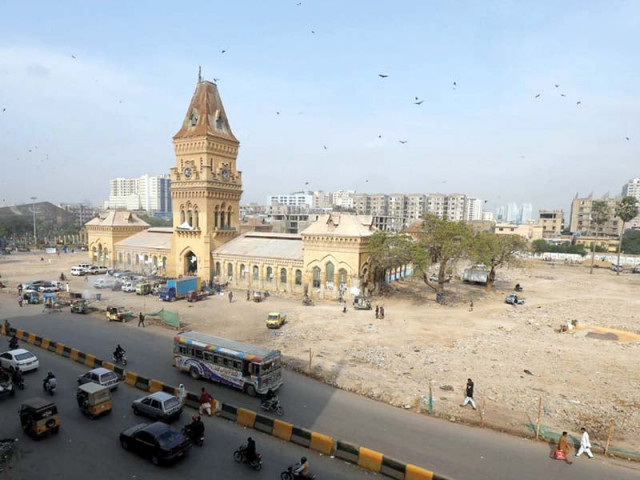ECC defers fund approval for Karachi
Financing framework seeks Rs509b from private sector, Rs125b from court funds

The federal government on Wednesday deferred approval of an administrative and financing framework for the Rs739 billion Karachi transformation package, which the centre wants to execute largely with the help of private sector due to fiscal constraints.
Headed by Finance Adviser Dr Abdul Hafeez Shaikh, the Economic Coordination Committee (ECC) of the cabinet deferred the approval till next meeting, said the finance ministry. Out of Rs1.1 trillion, the remaining Rs372 billion is the responsibility of Sindh government.
The financing framework presented to the ECC seeks Rs509 billion in funds from the private sector under the public-private partnership mode and Rs125 billion from the Supreme Court out of the Bahria Town funds.
The Ministry of Finance has already refused to provide additional funds and instead asked the Ministry of Planning to meet all the additional needs from its own sources, in case it does not get financing from the two other planned sources, the private sector and the Bahria Town funds being available with the Supreme Court.
The Ministry of Planning presented a summary to the ECC for approval of the administrative and financing framework for the Rs739 billion package out of the total size of Rs1.1 trillion.
Prime Minister Imran Khan had announced the Rs1.1 trillion package in the first week of September. But the government could not give necessary approvals for its swift execution.
“The agenda item on Karachi Transformation Plan was deferred to the next ECC meeting for detailed discussion,” stated a Ministry of Finance statement.
“The ECC deferred the approval due to paucity of time and will take up the package again next week,” said Federal Minister for Planning, Development and Special Initiatives Asad Umar.
Earlier, the planning ministry had sent a summary to the Cabinet Division for consideration of the federal cabinet. But the Cabinet Division returned the summary to the planning ministry with an advice to “re-submit the summary for consideration of ECC”.
According to the proposal, the NDMA will re-appropriate Rs7 billion out of its existing sources for the Karachi Transformation Plan and the law ministry will request the Supreme Court to allow the utilisation of Supreme Court Fund (Bahria Town settlement) for projects under the Karachi Transformation Plan.
It had also been proposed that a steering committee, led by MNA Najeeb Haroon, would oversee implementation of the package. A monitoring and evaluation team in the Ministry of Planning will be formed to assist the steering committee.
However, official documents showed that the Finance Division refused to provide alternative financing in the event of unavailability of funds from the Supreme Court, asking the Ministry of Planning to instead re-appropriate funds from the Public Sector Development Programme (PSDP).
The Finance Division stated that the prime responsibility for securing necessary funding for each component included in the Karachi Transformation Plan for the current and subsequent financial years, stays with the Ministry of Planning with allocation for projects under the public-private partnership mode.
The proposed mode of financing does not ensure full implementation of the package in three years, as 87% of the funding is proposed to be secured from the private sector (Rs509 billion) or from the Supreme Court (Rs125 billion).
The centre plans to fund just Rs98.2 billion worth of projects from the budget. From the PSDP, the federal government has committed to undertake the Rs46 billion K-IV project, Rs5 billion Green Line Bus Rapid Transit, Rs7 billion project for revival of river, nullahs and Rs36 billion project for the resettlement of affected people, according to the ministry.
The government has now decided to construct the largest project - the Rs300 billion KCR - with the help of private sector on build, operate and transfer (BOT) basis, according to the planning ministry.
The government wanted to finance two projects through the Supreme Court funds. These included Rs74 billion worth of roads astride Gujjar, Mahmoodabad and Orangi nullahs and the remaining portion of Lyari Expressway. Similarly, the KCR would be partially financed (Rs50 billion) from these funds.
The government was showing three projects in the public-private partnership mode - Rs130 billion development of areas astride cleared or rehabilitated nullahs, Rs130 billion construction of additional dual track (50 km) and freight terminal at Pipri and Rs300 billion KCR.
The federal government also wanted to use Rs7 billion of the NDMA for the clearance of rivers and nullahs and the temporarily displaced persons, said the officials.
Other decisions
The ECC approved the removal of 5% regulatory duty on the import of cotton yarn till June 30, 2021. The decision was taken after cotton production fell to only 8.5 million bales, which was 36% less than the estimated need of 13 million bales.
On the proposal of changing criteria for the provision of subsidised gas and electricity to exporters, the ECC decided to maintain the status quo with the condition that the Federal Board of Revenue (FBR) may register new manufacturers or exporters in the five major export-oriented sectors till June 2021. Earlier, the ECC had decided that subsidised power should only be given to those units that actually exported goods but the Ministry of Commerce objected to the proposal.
Published in The Express Tribune, December 3rd, 2020.
Like Business on Facebook, follow @TribuneBiz on Twitter to stay informed and join in the conversation.



















COMMENTS
Comments are moderated and generally will be posted if they are on-topic and not abusive.
For more information, please see our Comments FAQ